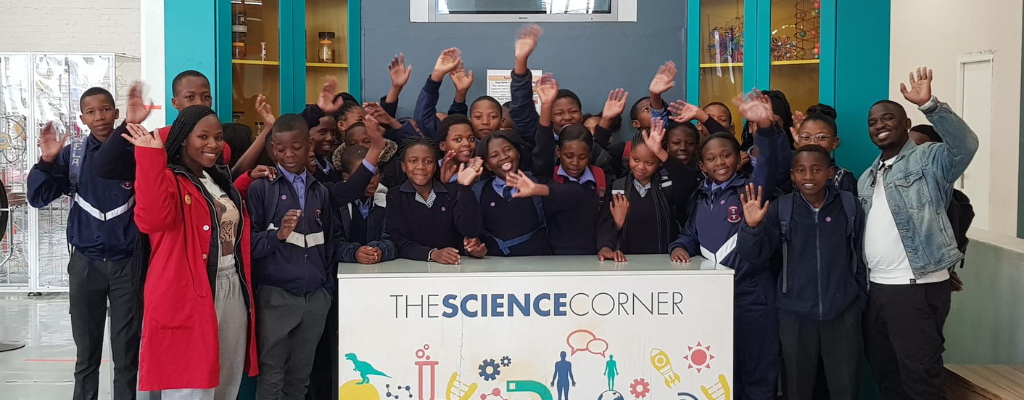The Sciences, Technology, Engineering and Mathematics (STEM) Club Network is a provincial programme initiated by the Western Cape Education Department (WCED), in collaboration with the Cape Town Science Centre (CTSC) which promotes and supports STEM Clubs based in schools. The STEM Club Network currently boasts over 70 STEM Clubs across all 8 educational districts, targeting both primary schools and high schools. The STEM Club Network is freely available to all schools within the Western Cape. To join the STEM Club Network, schools are requested to register their STEM Club/s. The benefits to joining the STEM Club Network include:
- Being part of a dynamic and active community of practice.
- Access to exclusive competitions and other exciting opportunities.
- Receive the regular STEM Club Network newsletter.
- Free training sessions.
- Point of contact should you need support or have queries.
- And much, much more!
STEM Clubs offer learners opportunities to explore science, technology, engineering and mathematics (STEM) topics in an informal setting, allowing them to experiment, to ask questions and experience challenges that interest them. STEM Club meetings are usually teacher-led but are driven by learners
It is generally acknowledged that there is a need to improve learner's STEM skills and knowledge in order for them to navigate their way through the world they live in and to successfully access the opportunities available to them (Afterschool Alliance, 2011). The general downward trend of elective participation in STEM subjects by learners is a growing concern. While numerous STEM support programmes target what happens in the classroom, much of what shapes a learner’s attitude, confidence and interest in STEM subjects and fields is cultivated by their experiences outside of the classroom. STEM Clubs, which develop aptitude and interest in STEM subjects and fields from an early age, and furthermore sustain their interest through the learner’s school career, increase the learner’s achievement and performance in STEM subjects. Chittum et al. found that with engagement in after school STEM Clubs, learners could be motivated in STEM subjects and that the experience had a positive impact on their perceptions about science as a field. (Chittum et al., International Journal of STEM Education (2017) 4:11).

School-based STEM Clubs provide opportunities for learners to explore STEM topics, providing exposure beyond the scope of the curriculum and encouraging a culture of lifelong learning. STEM clubs promote heuristic thinking, cultivate positive attitudes to STEM, help link abstract concepts learnt in class to the real-world and allow learners to be the authors of their own discoveries and learning, ultimately building their confidence and encouraging participation in competitions like Expos and Olympiads (and more).
Learners from both Primary and High schools benefit greatly from participation in STEM Clubs, improving the culture of STEM learning amongst participants which leads to other learners wanting to take up STEM subjects and in turn showcase their achievements in class.
- STEM clubs can be run at both Primary Schools (Grade 4 – 7) and at High Schools, possibly at two levels, (Grades 8 – 9 and/or Grades 10 – 12).
- There can be more than one STEM Club at a school. Each STEM Club must be registered separately – see point 8 below.
- The size of a STEM Club should be manageable for teachers and to fit in the space chosen for the meetings.
|
Get buy-in from the HOD's and the Principal. |
|
|
Work with at least one other Teacher all year. |
|
|
Choose a meeting venue. |
|
|
Announce the formation of the STEM Club in an open forum e.g. assembly. |
|
|
Call the group of interested learners together to form the Club. |
|
|
Survey these learners as to what their STEM interests are. |
|
|
Determine the name for the STEM Club. |
|
|
Register your club with the Cape Town Science Centre (CTSC). |
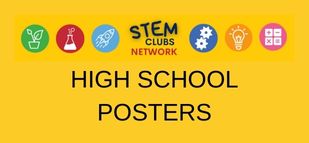
STEM Club Posters - High School
This is a set of 5 High School posters focussing on Biology, Chemistry, Engineering, Maths and Physics. These High School posters are useful for marketing your STEM Club in your High School. They show scientists in action and some careers. There is space on them to temporarily stick the Monthly High School Challenge Questions. . You can print them and prestik them to the walls outside or inside your STEM Club meeting room. (Suggested printing size – A1)
Open resource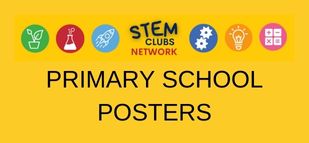
Stem Club Posters - Primary School
This is a set of 5 Primary School posters focussing on Biology, Chemistry, Engineering, Maths and Physics. These Primary School posters are useful for marketing your STEM Club in your High School. They show young scientists in action and some careers. There is space on them to temporarily stick the Monthly Primary School Challenge Questions. You can print them and prestik them to the walls outside or inside your STEM Club meeting room. (Suggested printing size – A1)
Open resource
Stem Club Career Posters
This is a set of 5 Career posters that are suitable for High or Primary schools. Each poster gives the details of some current and future Careers. These Career posters are useful for marketing your STEM Club in your school. They are also useful for discussing Careers in a STEM Club meeting. Suggestion is to print them and prestik them to the walls outside or inside your STEM Club meeting room. (Suggested printing size – A3)
Open resource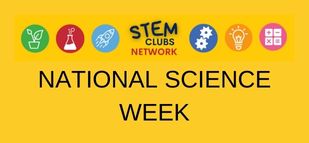
National Science Week 2022 Activity Sheet
This sheet can be used at any time of the year, as an activity sheet. It supplements the activities given out in the Jumpstart Kits and the Jumpstart Teacher Manual. (Suggested printing size – A4 back to back)
Open resource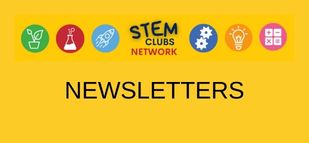
Stem Club Newsletters
Each month, the STEM Club Programme puts out a newsletter that follows a theme and showcases activities being done in STEM Clubs around the Western Cape. Extra STEM Club activities are added to the sheet. This newsletter is set in a format that should only be shown electronically to the STEM Clubs at a meeting. (Please note that permission has been given to show photos of the learners).
Open resource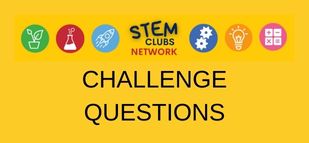
Stem Club Challenge Questions
Each month, the STEM Club Team issues a set of Primary and High School questions in one topic per month and published in English and in Afrikaans. Some STEM Clubs discuss the questions in a meeting and then the learners must answer the questions in their own words and submit their own individual answers electronically. Winners are decided on by selecting the best answer in a learner’s own words, and announced in the Newsletters and Prizes are awarded at the end of the STEM Club year, usually in October. The questions that are linked are from 2022 and for practise purposes only. (Suggesting printing size – A4, black and white on one side of a page)
Open resource

